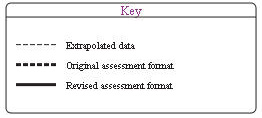Trend in White – Black NAEP mathematics average scores and score gaps for 13-year-old students

Findings
- Compared to 2004, there was no significant change in the gap in mathematics scores between White and Black students at age 13.
- The score gap between White and Black 13-year-olds in 2008 narrowed by 18 points compared to 1973.
* Significantly different (p < .05) from 2008.
NOTE: Score gaps are calculated based on differences between unrounded average scores. The lighter dashed lines for 1973 represent extrapolated data. Black includes African American. The White and Black race categories exclude Hispanic origin. View complete data with standard errors.
SOURCE: U.S. Department of Education, Institute of Education Sciences, National Center for Education Statistics, National Assessment of Educational Progress (NAEP), various years, 1973–2008 Long-Term Trend Mathematics Assessments.